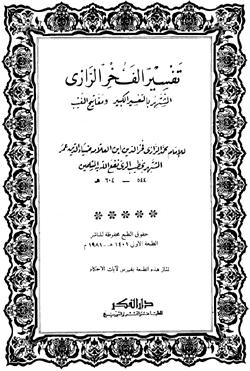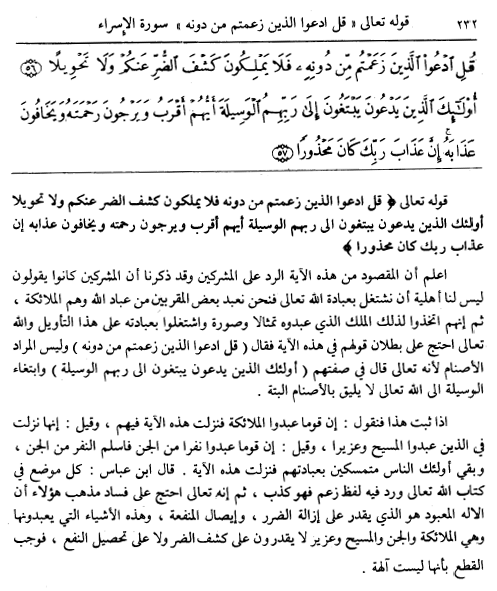| Tuesday, 18 November 2025 Home • About Us • Contact Us |
 | |
|
|
|
You are here:
Home /
Topics
/
Shafaa'ah
Mail to a Friend • Printer friendly 
Background and Introduction
Historically, the innovations of the first century were light innovations (Khawarij, Shi'ah, Qadariyyah, Murji'ah), in that they did not directly relate to Allaah Himself. Those that came in the second century hijrah were more severe in that they related directly to the belief in Allaah Himself (His Names, Attributes, His Uluww, His Speech), and then from this period the introduction of philosophy and gnosticism (mystical esoteric knowledge) led to further deviations. However, it took around six centuries for shirk (associationism) to spread amongst the Muslims on a wide scale. The seeds of this shirk were spread initially by the Ismaa'eelee Baatiniyyah known as Ikhwan al-Safaa (Brethren of Purity) in the third and fourth centuries, and they were given support by the Ubaidiyyah (Shii'ite rulers of Egypt) when they took power. Prior to this time (before the fifth century, i.e. 400H), whilst the variuos sects had deviations in issues of aqidah, the understanding of Tawhid al-Ibaadah was still relatively firm.
This shows that the greater deviations occurred when the people were further away from the era of revelation, and this is simply a cycle of history. This has always occurred after the sending of Prophets and Messengers, and it is indicated in the Prophetic texts for this ummah, such as those texts that mention that this (Muslim) nation will follow the footsteps of those (nations) that came before them (such as the Jews and Christians). For this reason, the greatest deviation, shirk with Allaah, was the last of the affairs to enter into the Ummah - long after the era of Prophethood.
Coming to the subject of this series of articles now, we present in this some quotations from the Tafseer of ar-Razi pertaining to the core arguments for the justification of supplicating to those besides Allaah and seeking their intercession, and through this we illustrate that this type of refutation against the grave and saint worshippers precedes Ibn Taymiyyah (rahimahullaah) by a century and Ibn Abdul-Wahhaab (rahimahullaah) by six centuries, and it also uncovers the academic and intellectual fraud of today's grave and saint-worshippers against the Scholars of Tawheed.
Fakhr ud-Din ar-Razi on Taking Angels, Jinns, Prophets as intermediaries
In the (first part) of this series (see here), it was established that ar-Razi showed rejection against those who venerate the graves, seeking to win the intercession of the righteous dead, and he stated that this is rebutted by the Qur'an. Here is his statement quoted previously, and it is in reference to the saying of Allaah, "And they worship besides Allah things that hurt them not, nor profit them, and they say: "These are our intercessors with Allah"." which is in Surah Yunus (10:18), he wrote:
ونظيره في هذا الزمان اشتغال كثير من الخلق بتعظيم قبور الأكابر على اعتقاد أنهم إذا عظموا قبورهم فانهم يكونون شفعاء لهم عند الله
Please refer to (Part 1) for the full context of the above quotation, because ar-Razi has stated that this action is equivalent to the practice of the idolators. In this article we want to now expand this and look at the statement of ar-Razi on another verse that relates to those worshipped besides Allaah, and which are other than idols, such as the Angels, Jinn and the Prophets [and likewise the Righteous]. And as we have already seen ar-Razi speaking about the people seeking intercession from the righteous dead by venerating their graves, then his comments on this verse apply to that situation too. He says (Tafseer ar-Razi 15/232-233):
In this passage, his commentary is on the verse:
So he writes:
Here ar-Razi has presented the argument that since no one besides Allaah has control over harm and benefit, including the Angels, the Jinn, the Prophets, then they do not deserve worship (from the greatest of which is supplication, invocation), and this includes, as per the statement we previously quoted from ar-Razi, the righteous dead, to whom people were flocking to and venerating their graves in the time of ar-Razi, which he pointed out, for the sake of seeking their intercession. Shaykh ul-Islam Muhammad bin Abdul-Wahhaab on This Topic We quote here from "Kashf ush-Shubuhaat", which is a systematic demolition of the arguments of the pagans who justify the worshipping of the righteous dead, and here the Shaykh brings this verse within the same context:
فإن قال: هؤلاء الآيات نزلت فيمن يعبد الأصنام، كيف تجعلون الصالحين مثل الأصنام أم كيف تجعلون الأنبياء أصناماً؟ فجاوبه بما تقدم فإنه إذا أقر أن الكفار يشهدون بالربوبية كلها لله، وأنهم ما أرادوا ممن قصدوا إلا الشفاعة. ولكن إذا أراد أن يفرق بين فعلهم وفعله بما ذكره، فاذكر له أن الكفار منهم من يدعو الصالحين والأصنام ومنهم من يدعو الأولياء الذين قال الله فيهم: أُولَـئِكَ الَّذِينَ يَدْعُونَ يَبْتَغُونَ إِلَى رَبِّهِمُ الْوَسِيلَةَ أَيُّهُمْ أَقْرَبُ ويدعون عيسى ابن مريم وأمه
From the above, you can see here that what is found in the commentary of ar-Razi we have quoted so far in this series is approximate and more or less identical on this issue of Tawhid al-Ibaadah, with what Shaykh ul-Islam Ibn Abdul-Wahhaab called to six hundred years later, and you should consider carefully once more the saying of ar-Razi, we quoted in the (first part) of this series:
ونظيره في هذا الزمان اشتغال كثير من الخلق بتعظيم قبور الأكابر على اعتقاد أنهم إذا عظموا قبورهم فانهم يكونون شفعاء لهم عند الله
For it, walhamdulillaah, exposes the fraudulent nature of the attacks made against Shaykh ul-Islam Muhammad bin Abdul-Wahhaab in particular, but also against Shaykh ul-Islam Ibn Taymiyyah.
Link to this article: Show: HTML Link • Full Link • Short Link Related Articles:
You must be registered and logged in to comment. |
|
|
© TawhidFirst.Com. All rights reserved.
|
 To the right is a cover page for the book "Tafsir ar-Razi", also known as "Mafaateeh al-Ghayb" belonging to
To the right is a cover page for the book "Tafsir ar-Razi", also known as "Mafaateeh al-Ghayb" belonging to  And the equivalent of this in our time is the occupation of many of the creation with the veneration of the graves of the senior [righteous] ones, upon the belief that when they venerate their graves, then they (the deceased) will become intercessors for them with Allaah.
And the equivalent of this in our time is the occupation of many of the creation with the veneration of the graves of the senior [righteous] ones, upon the belief that when they venerate their graves, then they (the deceased) will become intercessors for them with Allaah.
 Say (O Muhammad): "Call unto those besides Him whom you pretend [to be gods] besides Him. They have neither the power to remove the adversity from you nor even to shift it from you to another person." Those whom they call upon themselves seek a means of access to their Lord (Allah), as to which of them should be the nearest and they hope for His Mercy and fear His Torment. Verily, the Torment of your Lord is something to be afraid of! (Al-Isra 17:56-57)
Say (O Muhammad): "Call unto those besides Him whom you pretend [to be gods] besides Him. They have neither the power to remove the adversity from you nor even to shift it from you to another person." Those whom they call upon themselves seek a means of access to their Lord (Allah), as to which of them should be the nearest and they hope for His Mercy and fear His Torment. Verily, the Torment of your Lord is something to be afraid of! (Al-Isra 17:56-57) 